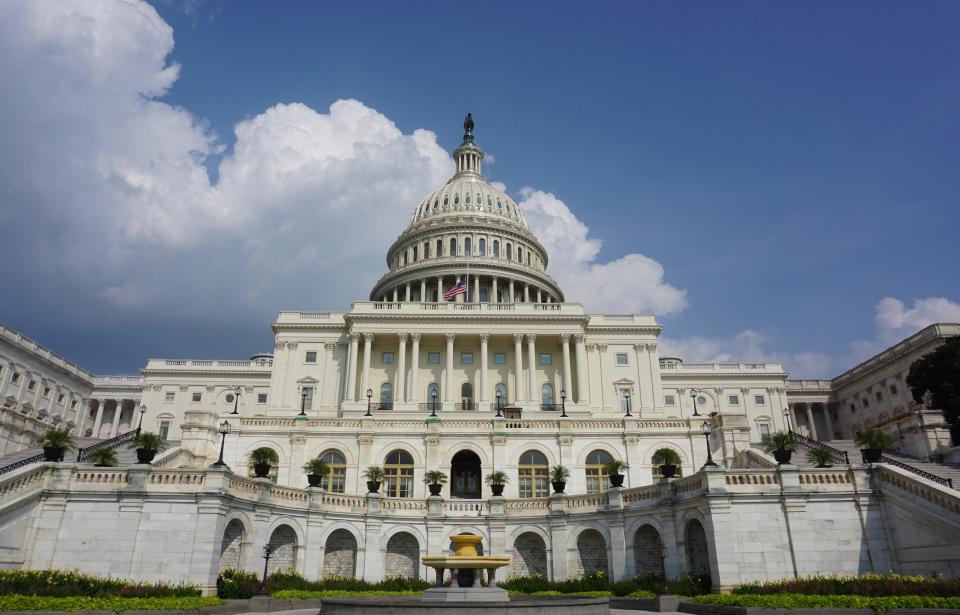Senate approves same-sex marriage bill after rejecting Lankford amendment
- Oops!Something went wrong.Please try again later.
- Oops!Something went wrong.Please try again later.
- Oops!Something went wrong.Please try again later.
- Oops!Something went wrong.Please try again later.
The U.S. Senate approved bipartisan legislation on Tuesday to protect same-sex marriage in federal law amid concerns that the Supreme Court could overturn its 2015 decision that recognized such unions as a constitutional right.
The vote was 61-36, with 12 Republicans joining 49 Democrats. Oklahoma Sens. Jim Inhofe and James Lankford, both Republicans, voted against the measure. The bill now goes to the House, which approved similar legislation in July protecting same-sex and interracial marriage.
“By passing this bill, the Senate is sending a message that every American needs to hear: No matter who you are or who you love, you, too, deserve dignity and equal treatment under the law,” said Senate Majority Leader Chuck Schumer, D-New York.
The Respect for Marriage Act requires states to recognize marriages from any other state and prohibits state officials from denying the full faith and credit of marriages from other states based on sex, race, ethnicity or national origin.
More:Supreme Court grapples with challenge to Biden immigration policy on deportation

It also would repeal the Defense of Marriage Act, passed by Congress in 1996, which defined marriage as between a man and a woman and denied federal benefits to married gay couples. The U.S. Supreme Court ruled the law unconstitutional in 2013, and it has not been enforced since, but lawmakers have not removed it from the books.
Before final passage, senators defeated amendments by Lankford and two other GOP senators intended to shield religious organizations from adverse actions for opposing same-sex marriage.
Lankford, echoing concerns of Southern Baptists, Catholics and others, said the religious liberty provisions in the bill didn’t go far enough and that the bill could lead to lawsuits filed by the government or private individuals against faith-based groups that provide services for the homeless, foster children and others.
Lankford said his amendment would clarify that faith-based groups with a traditional view of marriage that provide social services under state contracts could not be deemed “state actors” and sued for discrimination. Lankford’s proposal also would have eliminated the ability of a private individual to sue a faith-based group providing public services that did not condone same-sex marriage.
“Is today about respecting the rights of all or is it about silencing some and respecting others?” said Lankford, who worked for the Southern Baptist convention in Oklahoma before entering politics.
Sen. Rob Portman, R-Ohio, supported the bill and said it contained robust religious protections.
“It explicitly protects all existing religious liberty and conscience provisions under the First Amendment and federal laws, including the powerful protections provided by the Religious Freedom Restoration Act,” Portman said.
The legislation guarantees that it can’t be used to deny tax-exempt status, grants, contracts, licenses and other benefits because a person or group holds a traditional view of marriage, Portman said.
Lankford’s amendment failed by a vote of 45 to 52.
More:Oath Keepers leader Stewart Rhodes found guilty of seditious conspiracy in Jan. 6, 2021, attack
Wyoming Sen. Cynthia Lummis, a Republican, said she supports her church’s adherence to the biblical pronouncement that marriage is between a man and a woman. But she said she also supports the bill.
When the nation was founded, Lummis said, people had to “tolerate the seemingly intolerable about each other’s views and had to respect each other’s rights even before the Constitution enumerated those rights … For the sake of our nation today and its survival, we do well by taking this step — not embracing or validating each other’s devoutly held views but by the simple act of tolerating them.”
Since the Supreme Court in June struck down its abortion precedents and gave states the authority over abortion policy, Democrats have argued that the conservative justices could turn next to precedents on contraception and same-sex marriage.
Some of the anxiety stems from Justice Clarence Thomas’ concurring opinion in the case, Dobbs v. Jackson Women’s Health, which overturned Roe v. Wade and Planned Parenthood v. Casey. Thomas said the court should reconsider all of the court’s precedents that protect rights not enumerated in the Constitution, including same-sex marriage and contraception.
The House voted in July to guarantee access to contraception in all states.
This article originally appeared on Oklahoman: Senate passes marriage bill, rejects Lankford's religious amendment

